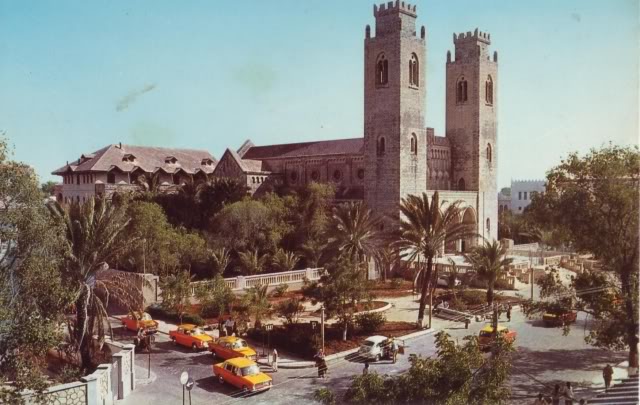In May 2015, U.S. Secretary of State John Kerry became the first person of his office ever to visit Somalia. Although it was an unannounced and very brief stop—he spent just over three hours in the country—the trip indicated that there have been real improvements in Somalia’s security situation. Nevertheless, many of the country’s security and political challenges remain. In a May 21, 2015 event “Counterterrorism and state-building in Somalia: Progress or More of the Same?,” Brookings Senior Fellow Vanda Felbab-Browndiscussed these challenges and briefed her spring 2015 research trip to Somalia. The conversation was moderated by Michael O’Hanlon, Brookings senior Fellow and co-director ofCenter for 21st Century Security and Intelligence (21CSI). The event launched a new Brookings 21CSI project—The Africa Security Initiative, which complements Brookings’s Africa Growth Initiative and will add a new institutional focus and locus of activity and research related to African security matters.

Felbab-Brown stressed that compared to 2009, much has improved in Somalia. Compared to her last trip in 2013, however, both security and political dynamics have worsened in the country. Although the jihadi terrorist group al-Shabab no longer controls large swathes of territory, its presence in Mogadishu and other cities is still palpable. The group continues to control roads in much of the country’s center and south, for instance, allowing it to extort tolls. Despite international efforts to disrupt its leadership, al-Shabab has stepped up attacks both in Somalia and abroad, as recently demonstrated by the horrific April attack on Garissa University College in eastern Kenya. This increase in attacks is not a sign of a weak, cornered terrorist group, said Felbab-Brown, but rather of one that is still dangerous, capable, and entrenched. Although al-Shabab’s attacks in Kenya are designed to demonstrate international operational prowess and exact revenge for the participation of Kenyan forces in the African Union Mission in Somalia (AMISOM)—an African Union effort to defeat al-Shabab—the group maintains a strong internal focus.
The counterterrorism goals of Somali President Hassan Sheikh Mohamud, outlined during his speech at Brookings in August 2014, are still only a distant hope, Felbab-Brown argued. Somalia’s security forces remain a collection of clan militias with local loyalties and a record of abuse, and are often mistrusted by local populations. They are often not paid for months and lack adequate equipment and training. Often cooperating with other Somali militias not anchored into the Somali Army, such as the forces of Ahmed Madobe in Kismayo, the principal anti-al-Shabab fighting force is that of AMISOM. Its 22,000 soldiers are predominantly provided by Uganda, Burundi, Ethiopia, Kenya, and Djibouti. Little coordination among the forces of the various countries and with AMISOM headquarters and the Somali government takes place. Despite two touted offensives by AMISOM in 2014—Operation Eagle and Operation Indian Ocean—AMISOM generally avoids military battles with al-Shabab and rarely undertakes active actions. Often its forces are stuck in garrison mode, a problem compounded by the fact that al-Shabab still controls logistical access even in areas of AMISOM presence. Moreover, even when sporadic offensive operations take place, both AMISOM and the Somali government and forces are mostly unable to deliver governance and services.
2016 is to mark an important year for Somalia. The redrafting of the country’s constitution is supposed to be finished and the country is to be transformed from a centralized state to a federal one, with sub-national state formation completed. Presidential elections are also scheduled to take place that year. But one key question is whether the elections can be held on time in a free and fair manner and with sufficiently broad participation, given the persisting difficult security situation and political challenges. These three elements are crucial state-building components of the Somali Compact adopted by international donors and the Government of Somalia.
However, how these commitments will be executed is even more important than whether the Somali government is capable of living up to the 2016 timeline, maintained Felbab-Brown. She argued that donors need to pay much more attention to the sub-national level governance processes, particularly as clan-based exclusionary politics continue to deeply divide Somalis and are beginning to produce new conflicts. Thus, state formation needs to take place in a transparent manner and with accountability to local Somalis, and not be simply usurped by local power brokers. A strong emphasis on inclusiveness and accountability—over clan loyalty— needs to be demanded of elites. Civil society actors as well as local businessmen should be included in the process of forming states and local governance as much as possible.
Somalia is experiencing a revitalization of its economy, but whether the country’s economy will be transformed from one of war to one of sustainable peace, and whether the country’s entrepreneurs and other Somalis will manage to look beyond their narrow interests and become a strong force for peace, inclusiveness, and accountability, remains to be seen. Yet, the international community must demand such political principles out of Somali stakeholders to ensure that its assistance ultimately has a positive impact on the lives of average Somalis. It also must be realistic in its assessment of how long the Somali state-building effort will take and persevere in its commitments.